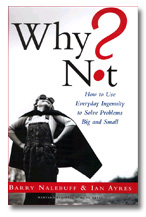Books |
Why Not? How To Use Everyday Ingenuity To Solve Problems Big And Small
Barry Nalebuff & Ian Ayres
By
Published: Jul 29, 2014
Category:
Non Fiction
All these years, you’ve been eating bananas the wrong way. The part you think is the top? Wrong. It’s the bottom. You doubt that? Look at any picture of a monkey eating a banana. He holds what you think is the top in his fist, where it becomes a serviceable handle. Then he peels the top — what you think of as the bottom — and happily munches away.
For that matter, when you eat ice cream, how do you put the spoon in your mouth? Right side up, I’ll bet. Tasty? You may think so. But would you change your mind — and your eating habits — if you knew your taste buds were all on your tongue?
Let’s consider car theft. You may think you have thwarted criminals by putting a Club on your steering wheel. And you have — for your car. At the same time, however, you have sent the car thief down the block looking for another victim. But if you had installed a Lojack, the would-be thief wouldn’t have known your car was protected. Yes, he might have stolen it. But the odds are very good that he would have been caught — and sent away where he couldn’t steal any more cars. Which is why Massachusetts decreed that cars with Lojacks get a 25% discount on insurance. And why auto theft in Boston dropped 50%.
Brilliant ideas? Yes. But not, say Yale professors Barry Nalebuff and Ian Ayres, beyond your reach. Innovation, they argue, can be taught. You just need an open mind, a decent imagination and a willingness to challenge received wisdom. Like Bette Nesmith (yes, mother of the leader of The Monkees). She wondered why artists could paint over their mistakes but typists couldn’t. The result: White-Out. The later result: Gillette bought her company for $48 million. Or like Wayne Gretsky, the first hockey player to take the puck behind the opponent’s goal. That created a blind spot, which he could use to pass or score.
In the pages of this book, you’ll find one great idea after another. How about organ donation? Like many good Samaritans, you want your parts given to others upon your death. The problem is you haven’t signed your driver’s license or any other form to give doctors permission to mine your body. Result: many fewer organ donors than we need. But what if you flipped the process? What if, instead of opting in, you’d have to opt out of organ donation? Then we’d be like Sweden: an abundance of potential donors.
"Why Not?" is full of great ideas. Some have become reality; others remain on the drawing boards. One of the best chapters, even if it’s sort of a commercial, takes you through the invention and launch of Honest Tea, a very welcome health drink that has made its co-owner, Barry Nalebuff, extremely rich. [To buy the paperback from Amazon, click here.]
But even better than the stories and the little jokes is the mental process that the authors suggest. They show you why it’s good to ask, "What would Croesus do?" — that is, how would you approach a problem if money were no object. They take you through a process of assessment and analysis, so you can tell if your idea has any chance of making it in a marketplace filled with new products.
Most of all, they make your world a little more interesting. Because their key idea — "how to solve problems big and small using everyday ingenuity" — is provocative, fun and, just possibly, profitable. And that is a combination that’s even better than eating a banana the right way.


